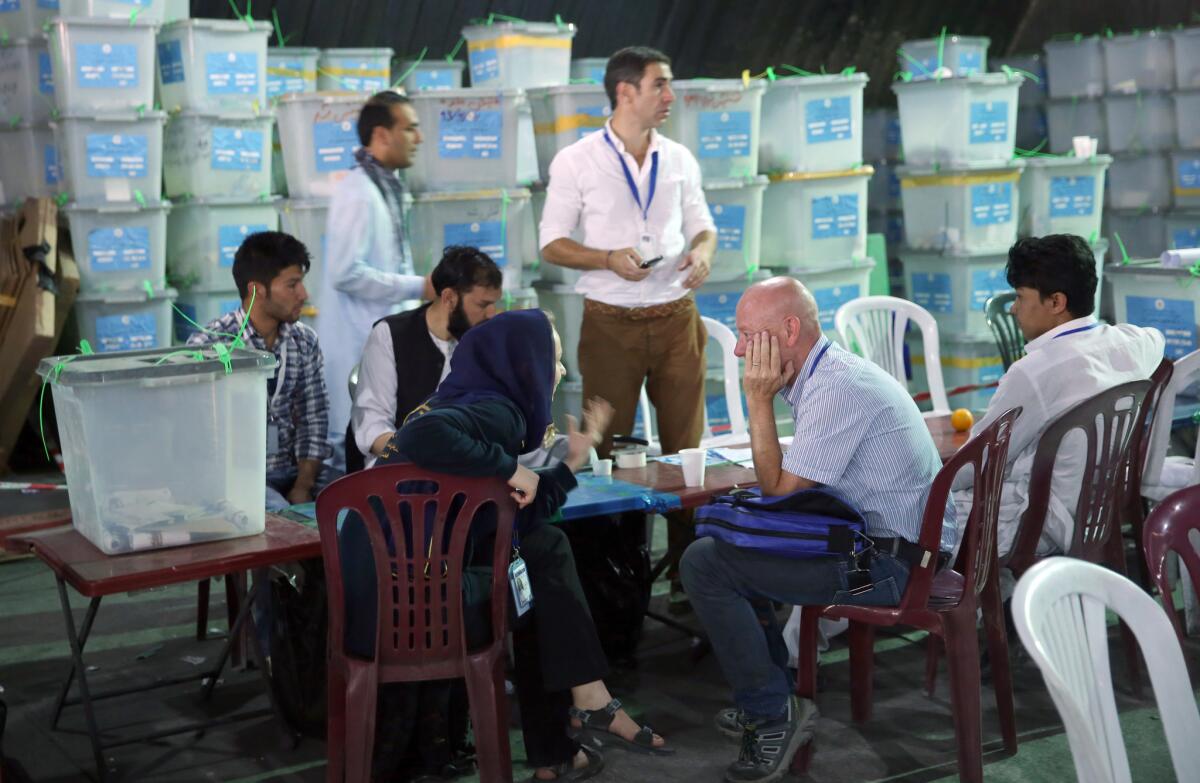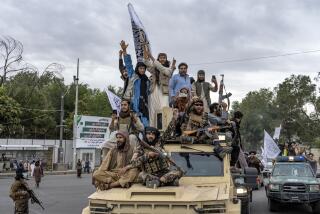Delays, fights marred Afghanistan’s election recount

Inside the hot, musty airplane hangar where international officials were supervising Afghanistan’s presidential election recount, the rival camps had sparred for days until the tension finally boiled over.
Confronting a young poll worker carrying ballot boxes, election observers loyal to candidate Abdullah Abdullah demanded to see his identification. When the man refused, one Abdullah supporter called him a spy for the opposing campaign and snapped pictures with his smartphone.
Three poll workers rushed to their colleague’s side. According to witnesses, several Abdullah supporters then pulled out knives, brass knuckles and pliers. A fight erupted that left several people injured, prompted a tongue-lashing from United Nations officials and forced yet another suspension in the vote counting.
The Aug. 19 altercation was the most serious of several fights that interrupted the recount effort, which was introduced with fanfare last month by Secretary of State John F. Kerry but has been plagued by delays, mistrust and violence that have frustrated U.S. hopes of a smooth transition of political power in Afghanistan.
Abdullah withdrew his observers from the recount process Wednesday, alleging that the audit of all 8 million ballots from June’s runoff was “built in a one-sided manner” favoring his rival, Ashraf Ghani. U.N. officials then persuaded Ghani’s team to pull out its observers to maintain the appearance of impartiality, saying the review would continue without either team’s representatives present.
The developments have cast doubt on the viability of a national unity government including members of both campaigns, which Obama administration officials believe is crucial to ensuring political stability as the United States withdraws most of its troops from Afghanistan by year’s end.
U.S. officials in Kabul held meetings with the candidates and said that both men remained committed to forming a unity government, which envisions the president sharing executive powers with the runner-up.
But analysts say that Abdullah’s rejection of the audit – along with both campaigns’ accusations that the other had infiltrated the Independent Election Commission, the Afghan body overseeing the process – has already poisoned the result.
“At this point they can carry forth with the audit in whatever manner they like. We have no part in it,” Muslim Saadat, a spokesman for the Abdullah campaign, said Thursday. “It was all a show, a circus.”
The White House wants a new Afghan president inaugurated swiftly in order to conclude negotiations on a bilateral security agreement under which the U.S. would keep nearly 10,000 troops -- about a third of its current force -- in the country to continue training Afghan forces and conduct counter-terrorism operations. Both Ghani and Abdullah have said they would sign the pact.
U.N. officials said Thursday that the audit would be completed about Sept. 10, with the new president inaugurated soon afterward.
But Afghan experts say that even if Abdullah and Ghani can strike a deal, the large election coalitions that each has assembled – including high-ranking government ministers, provincial governors, businessmen and ex-warlords – may not fall in line.
Some of the most bellicose rhetoric has come from the candidate’s prominent supporters. Atta Mohammed Noor, governor of the northern province of Balkh who is considered one of Abdullah’s strongest supporters, warned this month of “a big civil uprising” if the audit was found to be swayed in Ghani’s favor.
“Both teams have high-level stakeholders who are out to secure their personal and political interests,” said Abdullah Azada Khenjani, news director at 1TV, a leading private television network in Kabul.
For many Afghans, a government that makes space for both teams seems similar to what they’ve seen before. While both candidates have pledged to stamp out corruption, which has mushroomed during President Hamid Karzai’s 12-year administration, their teams are composed of many of the same power brokers whom Karzai had to appease in order to maintain stability.
“If you look at who is in both teams, including those who endorsed the candidates in the second round, they’re all familiar faces,” said Obaid Ali, an expert with the Afghanistan Analysts Network, a Kabul-based independent research organization.
Many Afghans have grown disillusioned with an election that began with promise in April, when the first round of voting featured robust turnout and few major accusations of fraud.
Abdullah, who easily won the most votes in the first round, alleged widespread fraud after initial results from the runoff showed Ghani with a substantial lead. On July 12, Kerry announced in Kabul that all 8 million runoff ballots would be audited under U.N. supervision.
But from the start, the audit was marked by tension. For weeks, the two teams could not come to an agreement on the criteria for invalidating suspect votes. The counting was halted eight times even before the Aug. 19 altercation between election workers and Abdullah supporters.
Abdul-Rahman Kharoti, who oversaw the Ghani campaign’s observers, expressed alarm that Abdullah supporters were able to bring weapons inside the compound, which was guarded in part by soldiers from the U.S.-led military coalition.
“Every time we enter or exit the premises we have to proceed through several rounds of strict security, but these guys had brass knuckles, pliers and knives -- big knives,” Kharoti said.
Fazel Rahman Orya, an Abdullah campaign official, accused the election commission of failing to respond quickly when the fight broke out, saying that the Ghani campaign had infiltrated the local police branch. He accused the Ghani campaign of planting ethnic Pashtun supporters “to start trouble” in two hangars containing ballot boxes from provinces with high rates of suspicious votes.
He said that was the catalyst for the altercation because “all day we saw completely empty ballot boxes that were marked as having 580, 590 and 600 votes, all for Ashraf Ghani.”
International monitors brought in by the U.N. were given only advisory roles, but they constantly faced accusations from the rival camps. One Abdullah observer told a U.N. monitor, “I don’t know how much the Ashraf Ghani team is paying you.”
The U.N. observers were sometimes shocked by the apparent fraud. Looking at the results from one ballot box in the eastern province of Paktika, which showed 594 votes for Ghani and six for Abdullah, a foreign observer said: “This wouldn’t even be possible in the Soviet Union.”
Experts say the messy process could benefit the man being replaced.
“If these two do a bad job, if they make the situation worse, Karzai can come back and say: ‘See, I was the only one who could run this country properly,’” Ali said.
Latifi is a special correspondent. Staff writer Shashank Bengali reported from Irbil, Iraq.
For more news from Afghanistan, follow @SBengali on Twitter
More to Read
Sign up for Essential California
The most important California stories and recommendations in your inbox every morning.
You may occasionally receive promotional content from the Los Angeles Times.











